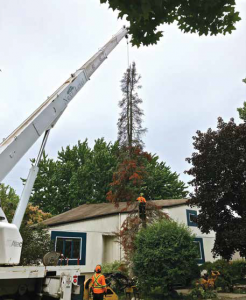By Kate Reekie
With governments and businesses around the world finally getting serious about climate change and setting ambitious targets for greenhouse gas emissions reductions, the focus now turns to making sure these commitments are met. To date, the focus has primarily been on renewable energy and energy efficiency as the main ways to meet climate goals. But while the energy sector accounts for about 55 per cent of the world’s carbon emissions, the other 45 per cent comes from how we make and use products and how we produce food.
That means that our consumption patterns are critically important, not just in reducing pollution and the resulting stress on land and water ecosystems but also in fighting climate change. While a low percentage of Ottawa’s emissions come from the waste we generate – about eight per cent – this does not count the huge emissions generated in the rest of the product value chain, including emissions from the extraction of raw materials, manufacturing, packaging and transportation.
Though it’s better than sending trash to landfill, recycling isn’t a panacea. It entails significant emissions, so it is only a partial solution and should be avoided as much as possible. Packaging accounts for a significant proportion of our waste and recycling. Citizens have an important role to play in reducing the amount of new stuff we consume and the amount of waste and recycling, we produce as a result.

Time catches up with all living things. This mature 40 foot spruce on Elliot Avenue recently succumbed to old age. It has been providing shade, oxygen, beauty and nesting sites for over 50 years. In less than one hour, modern technology turned it to wood chips. This is proof enough that OOE residents need to pay attention to how the City manages its urban forest for present and future generations.
Photo by Peter Croal
Reducing your packaging waste Opportunities to reduce your waste footprint are expanding. A tip as you begin your journey: don’t be dismayed if you can’t do it all. Start with what’s easiest for you. Do more as it begins to become second nature. One of the highest-value actions to reduce packaging waste is to purchase food, personal care and cleaning supplies in bulk and not using plastic bags. Save your jars and containers and bring them to the Nu zero-waste grocery store on Main Street for refilling. Bulk Barn at Billings Bridge has just announced that it is reinstating its reusable container program, so you can bring in clean containers for refilling there as well.
Unpackaged options for fresh produce are now available at most major grocery stores. Shopping at the Main Street Farmers’ Market or through community shared agriculture (CSA) programs will also ensure less excess packaging. Don’t throw out empty liquid soap, shampoo, conditioner, laundry or dish detergent bottles – bring them in to All Eco on Bank at Fifth for refilling.
Takeout meals and beverages are another big source of waste, which largely goes straight to landfill. Most local restaurants offering takeout allow you to bring in your own containers when picking up your order, if you call ahead and ask them not to package it (and don’t use third-party delivery services). While some coffee shops have stopped allowing customers to bring in reusable mugs during COVID, others still offer this option. And single-use drink containers – both cans and bottles – merit self-reflection: Do I really need that juice, energy drink or bottled water? Ottawa’s tap water is top-notch, free and the best option for your health. Consider getting a SodaStream to easily turn tap water into sparkling water – available at Capital Home Hardware on Bank Street at Second Avenue.
Finally, e-commerce has skyrocketed over the past year because of the pandemic. The packaging waste, like cardboard boxes and fillers, and the emissions generated by home delivery are clearly unsustainable. While ordering online is difficult to avoid completely, buying from local vendors and opting for curbside pickup instead of delivery can help mitigate this waste.
In addition to reducing packaging waste, there are many ways to give new lives to old items, and that is always preferable to recycling, given the energy, waste and pollution involved in the recycling process. One person’s trash is another’s treasure! Reducing your non-packaging waste
• Plant nursery pots: Ritchie’s Feed & Seed accepts these for customers wanting free pots for transplanting. Or find a local gardener who will use them by advertising them on the popular Buy Nothing Old Ottawa East Facebook group.
• Boxes: Before you discard your large cardboard boxes and fillers, consider offering them to someone who may be moving. Reach out through the Buy Nothing group. Smaller boxes can be decorated and are great for kids to store their treasures!
• Furniture and household goods: Helping with Furniture is a local nonprofit organization that will take furniture, household goods, electronics and bikes in good repair for families in need. Selling furniture on Kijiji or Marketplace allows creative buyers to upcycle older pieces and give them a new life.
• Building materials, fixtures and appliances: The Re-Store accepts donations to be resold, with proceeds going to Habitat for Humanity.
• Computers and related equipment: CompuCorps have a zero-landfill policy and fix and redistribute donated computers for the underprivileged and at-risk youth. If computers are not fixable, they will send them to responsible recyclers. Secure data sanitization is performed.
• Tools: The Ottawa Tool Library accepts donations of tools of all sorts to lend out to others. This is a great way to maximize the utility of underused tools in your basement or garage. It is also a useful service to avoid buying tools for occasional use only.
• Clothing: Dress for Success takes donations of clean, gently used suits and business attire to empower their women and gender non-conforming clients who are preparing for job interviews. Most lower-quality clothes donated to the large used clothing stores, unfortunately, end up in Africa where they are not wanted.
• Textiles: Eco-Equitable is a social enterprise that accepts donations of clean, unsewn, good quality fabrics of over one meter to help newcomer women gain job skills in sewing.
• Wire hangers: Glebe Tailoring and Hillary’s on Bank Street will take back wire clothes hangers or, better yet, leave them behind at the store (along with the plastic wrap) when you pick up your clothes.
Kate Reekie is chair of the Glebe Community Association’s Zero-Waste Committee. This article was previously published in the Glebe Report and is reprinted in edited form with permission.






